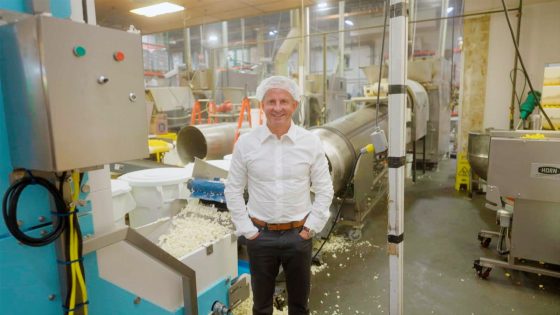Charles Coristine used to revel in working at Morgan Stanley. He loved the pace, even waking up in the middle of the night to trade in the Tokyo and London stock markets.
In 2011, after nearly two decades on Wall Street, Coristine burned out. He tried multiple remedies: switching to a vegetarian diet, meditating, enrolling in an MBA program. None of them worked.
At a barbeque, Coristine met an owner of snack company LesserEvil, who talked about wanting to sell his “flatlining” business. Coristine had no food industry experience, but was intrigued by the idea of a fresh start â and he liked that the company’s name was “synchronistic” with a healthy, mindful lifestyle, he says.
In November 2011, Coristine bought LesserEvil for $250,000 from his savings, plus a future payment of $100,000, according to documents reviewed by CNBC Make It. The risk was impulsive and ill-researched, he says: LesserEvil, which aimed to offer consumers healthier popcorn and snack alternatives, was losing money and bringing in less than $1 million in annual revenue at the time, the company estimates.
Yet the Danbury, Connecticut-based company has grown significantly under his watch. As CEO and president, Coristine grew its annual gross sales to $103.3 million in 2023 â including $82.9 million in net sales â and got its products into major retailers and corner stores across the U.S.
The business, which sells a variety of popcorns and air-popped Cheetos-like puffs and curls, has been profitable since 2021, according to company estimates. It made $14.4 million last year in earnings before interest, taxes, depreciation and amortization, or EBITDA.
“I didn’t know anyone in food … to ask whether I was crazy or not, but that’s probably good,” says Coristine, 52. “If I had done a lot of research and looked into it, I would have realized that the probability of success was pretty low.”
Here’s how Coristine is making LesserEvil into a household name.
A ‘scrappy’ reinvention
When he bought LesserEvil, Coristine was working at TD Bank and pursuing an MBA at Cornell University Graduate School.
In 2012, he got his MBA degree and started his new full-time job as LesserEvil’s CEO. Among his first moves: hiring his graduate school friend Andrew Strife as COO and CFO, and his wakeboard instructor as head of marketing.
Along with the previous regime’s accountant, the small team worked from an office in Wilton, Connecticut, to update LesserEvil’s branding and create their own production line. The old-fashioned branding wasn’t attracting customers, and the company was paying about 20% of its revenue from each sale to co-packers who helped make and ship out the snacks, Coristine says.
Charles Coristine, CEO and president of LesserEvil
CNBC Make It
Coristine’s savings had largely run out, so the team raised an undisclosed amount of money from their friends and family, and secured more financing through a connection Coristine had at a bank, says Strife. They moved into a 5,000-square-foot factory in Danbury in 2012, and filled it with used equipment purchased at auctions.
The team made “friends with welders down the street,” who could weld wheels and popcorn shoots onto the machinery, Strife says. They painted factory’s exterior black and plastering a yellow “LesserEvil” logo to the side of the building themselves. As Coristine recalls, drivers started pulling off the road, entering the factory and asking, “Is this a strip club?”
“Everything was scrappy and needed to be reinvented as we went along,” says Strife.
New branding and an unconventional ingredient
In 2014, when a neighboring carpet factory moved out, LesserEvil knocked down the wall and added 2,000 square feet and a production line to its operations.
That year, Coristine’s personal nutritionist offered a health-focused suggestion: Use coconut oil to pop the popcorn. Coristine was skeptical that coconut oil would stay fresh in a snack bag, so he literally shelf-tested it, he says: “We put it on the top of a fridge, which gets really hot [and left it for] for three months.”
The oil stayed fresh, and Coristine liked the surprisingly buttery taste, so LesserEvil launched the reformulated product with a new laughing Buddha logo in 2014 â calling it the Buddha Bowl. It brought in roughly $2 million that year, accounting for a third of LesserEvil’s annual revenue, the company says.
Coristine met LesserEvil’s CFO and COO Andrew Strife in an MBA program
CNBC Make It
Kroger, the first major retailer to sell LesserEvil, started stocking its products in 2015. That partnership helped fund another move for LesserEvil in 2017 â this time, to a 20,000-square-foot factory, says Strife.
A year later, the company got its first outside funding â about $3 million, the company says â from sustainable food and agriculture investment firm InvestEco. Coristine and his team used the funds to add production lines to the new factory and update LesserEvil’s packaging again: Each product now features its own “guru,” from the ancient Greek poet Homer to Henry David Thoreau.
The rebrand, and added products, helped push the brand into profitability. Coristine started paying himself a salary from LesserEvil that year, the company says.
‘It doesn’t feel like work’
LesserEvil’s goal has always been to differentiate itself from competitors with non-standard ingredients like extra-virgin coconut oil and avocado oil, says Coristine.
Sometimes, using atypical ingredients can have consequences: A Consumer Reports investigation from June found “concerning amounts of lead” in two of LesserEvil’s Lil’ Puffs snacks for kids. The company issued an apology, and tells Make It that it’s relaunching the puffs â free of the cassava flour that previously contained lead â later this year.
The company still brought in $62 million in net sales during the first half of 2024. It used another round of funding â $19 million, in a round led by investment firm Aria Growth Partners, LesserEvil says â to buy out prior investors and open a new factory in New Milford, roughly 15 miles from its Danbury facility.
Between two factories, LesserEvil now pops 5,000 pounds of popcorn per hour, according to the company
CNBC Make It
Today, the company has 280 employees. Coristine’s short-term goals: Keep growing and launching new products. Longer-term, he simply wants the company to “be a brand that could be around for along time,” he says.
LesserEvil has already succeeded in helping Coristine solve a more personal problem, he adds â he works less, from about 7:45 a.m. to 4:30 p.m., and feels happier since leaving Wall Street.
“It feels joyous, so it doesn’t feel like work,” says Coristine.
Want to master your money this fall? Sign up for CNBC’s new online course. We’ll teach you practical strategies to hack your budget, reduce your debt, and grow your wealth. Start today to feel more confident and successful. Use code EARLYBIRD for an introductory discount of 30% off, now extended through September 30, 2024, for the back-to-school season.
Plus, sign up for CNBC Make It’s newsletter to get tips and tricks for success at work, with money and in life.
Source Agencies



